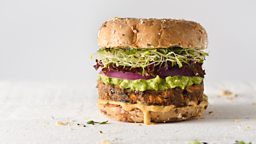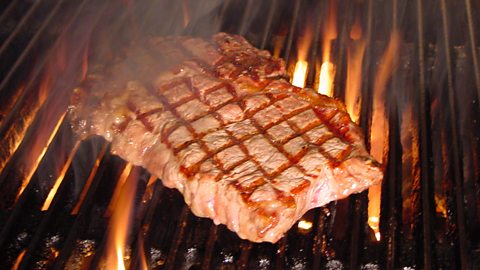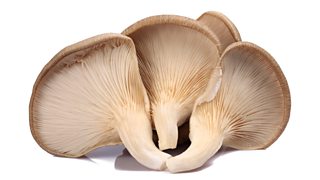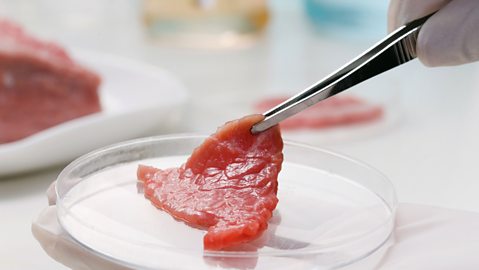The juicy story of veggie meat
Plant-based food has become so ubiquitous that we don’t give a second thought to the meat-free mince, chicken-style pieces, prawnless scampi, meatless sausages and even ‘bleeding’ burgers that line the supermarket shelves. We take for granted the availability of products like veggie burgers, which have become such a staple part of a plant-based diet it’s hard to think of a time without them. The introduction of Gregory Sams’ VegeBurger mix to supermarkets in 1982 was the game-changer.
By tackling the meat-dominated fast food industry head on with a viable, pleasingly-textured alternative to a meat patty, Greg brought accessible vegetarian food to the masses by inventing the VegeBurger. With the help of some water and an optional egg, anyone could transform the mixture of sesame, soya, oats, wheat and veg into proper patties.

In One to One: Veggie Roots, Miles Chambers interviews pioneers in plant-based food about the ongoing progress of the meat-free movement. We’ll find out how far the meatless industry has come since the early days of Greg’s bagged burger mix.
Salad Days
Gregory wasn’t born into vegetarianism, in fact he spent the first decade of his life eating meat. His dietary diversion came when he was 10-years-old.
Before Greg was born, his father had been caught up in an explosion in the Battle of Saipan during the Second World War. His trauma led to severe weight-loss, which was remedied by the recommendation of a whole food diet.
-
![]()
One to One: Veggie roots
Miles Chambers meets the plant-based pioneer, Gregory Sams, who came up with the VegeBurger idea.
Growing up eating nutritious whole food prepared by his mother meant Greg’s decision to cut out meat too at the age of 10 didn’t feel like a huge leap.
Gregory Sam, the inventor of the VegeBurger, wasn鈥檛 born into vegetarianism. He spent the first decade of his life eating meat.
He went the entirety of his school years and into his first year of university before he met another vegetarian, yet surprisingly he didn’t feel left out: “I felt superior!” he laughs.

What are the roots of vegetarianism?
The historical roots of vegetarianism, why it began and the rise in interest.
The beginning of the VegeBurger
Creating a viable alternative to meat was a bold move, particularly when taking on a fast food-favourite: the burger.

When Greg first developed the VegeBurger mix, he had never eaten a hamburger in his life. While not looking to exactly recreate the flavour of beef mince, he wanted to create a savoury patty which replicated meat’s ‘mouth satisfaction’, and spent months experimenting with ingredients.
He may not have had a reference point, but he knew he had nailed the texture and flavour when his wife, who was not a vegetarian, finally asked for a second bite of the sample mixture.
Despite the relatively small vegetarian population of the time, its success was unprecedented. It was snapped up not just by meat-eaters seeking a healthy burger alternative, but also by those who Greg describes as ‘unknown vegetarians’.
Miles Chambers and Greg Sams both moved away from vegetarianism in their twenties.
When Greg first developed the VegeBurger mix, he had never eaten a hamburger in his life. He spent months experimenting with ingredients.
Miles spent his childhood envying the meaty meals eaten by his friends. On leaving school, he got a job in McDonald’s and it was at this point that he was tempted away from vegetarianism by the fast food he was preparing. He found he missed chicken and the spicy meat of his Jamaican culture.
After more than a decade of strict vegetarianism, Greg also moved to eating meat on occasion. His dietary change was the result of a reality check he received when visiting relatives in Syria. Meat was eaten incredibly infrequently by his Syrian family and was saved for special occasions such as his visit.

What influences the food choices you make?
Why do some people make different choices from the crowd?
He turned down the lamb and chicken they had specially sourced and killed to mark the family’s visit. It was only on his journey home that he realised what offence he had caused: “I felt like a right prig; I dishonoured the lamb and my relatives.” After this he decided he would eat high-welfare meat very occasionally.

What are the meat-free alternatives we're choosing?
The rise in flexitarians is creating a growing market for mock-meat or meat substitutes.
Today鈥檚 trends
Today, plant focused eating is seeing exponential growth. Gone are the days of Greg’s ‘unknown vegetarians’ who didn’t even register on the consciousness of food suppliers.
Between 2014 and 2019 alone, Britain鈥檚 vegan population quadrupled. It is based on plants and occasional animal products.
Between 2014 and 2019 alone, Britain’s vegan population quadrupled and in recent years a third of the population has lowered or halted their meat consumption.
With greater demand comes a diversity of choice. Supermarkets which started with packet mixes in the 1980s now have fridge and freezer aisles groaning with meat substitutes.
Many consumers giving up their favourite animal based foods for ethical reasons still desire the flavour and texture of meat. They don’t simply want to remove meat and turn to veg; they want to replace it with the next closest alternative.

Flexitarians: is meat-eating dying out?
Are you one of the growing band of "flexitarians"?
Plant-focused or meat free?
Food writer and was put off eating meat by a documentary which exposed the realities of meat production. Like many vegetarian converts, she missed and craved the dishes she had grown up with, especially Caribbean food which represents home and comfort to her.

Rachel’s solution has been to take the spices and seasoning of her favourite dishes, while finding plant-based alternatives for the meaty texture. One of her top tips for emulating the texture of meat is to use chewy oyster mushrooms which shred and pull apart in a similar manner.
She solves the absence of meat juice and fat by coating the food in plant-based oils. She knows that her meals don’t taste identical to their meat equivalents, but she hopes that they bring about the same levels of satisfaction.
Is cell-based cruelty free?
Making a vegetarian carbon copy of a meat dish in a home kitchen is impossible, but scientific advances mean that slaughter-free meat will soon be an option.
The solution is lab-grown meat which, at present, is ruinously expensive and time-consuming to create, but could enable staunch carnivores to enjoy meat without animal slaughter. A promising aspect of lab-grown meat is that the cells required to create proliferating cultures (leading to an ongoing meat supply) don’t have to be taken from dead animals.
Stem cells can be modified genetically to mature into different types of cells, so one sourced from the root of a feather could in fact be used to produce meat. At present, these processes create a meat that can satisfactorily be turned into processed products like mince, sausages, burgers or nuggets rather than the more complex structure of breast meat or a rump steak. Though these will be the next step.

Clean meat craze: our next food revolution?
What if eating a beef burger didn鈥檛 mean killing a cow?
Mass-production has not yet been achieved, and this engineered meat isn’t on the market at the moment, but it is thought that small-scale production for restaurants will become available in the very near future.
I think a plant-based diet is the future, and that doesn鈥檛 mean it excludes anything.Greg Sams, inventor of the VegeBurger
Greg is adamant that plant-based diets are the way forward. He clarifies that this doesn’t mean an entirely vegetarian lifestyle:
“I think a plant-based diet is the future, and that doesn’t mean it excludes anything. It is based on plants and occasional animal products.”
He is keen to do away with labelling ourselves as meat eaters, vegetarians or vegans and instead just to eat what makes us feel good. The globalisation of plant-focused eating, believes Greg, will do more for the environment than legislation and taxation.

Why vegan sausages might be a thing of the past
France has banned vegan or veggie food from using words usually associated with meat.
Food writer and YouTuber Rachel Ama thinks about what the future of food will look like for her own child. She’s excited by the speed at which our attitudes to food are changing and by the prospect of being part of the changing way plant-based food is viewed by society. She urges would-be vegetarians and vegans not to feel guilty for not adopting a 100% plant-based lifestyle. She advises baby steps and suggests picking just one day a week to experiment with a meat-free alternative to a favourite dish.
If it’s a disaster, so be it, but if it’s a success, you may never look back. Who knows, you could create 2020’s answer to the VegeBurger?
More from Radio 4
-
![]()
One to One - Veggie roots
Miles Chambers meets the plant-based pioneer, Gregory Sams, who came up with the idea of the VegeBurger.
-
![]()
The Bottom Line: Plant-based foods
How can business benefit from the popularity of vegetarian and vegan eating in the UK? And is this a fad or something more sustainable?
-
![]()
Seven reasons why people are going vegan
Why more of us are swerving meat and dairy and happily going herbivore.
-
![]()
11 sizzling tips for BBQing like a pro
More tips than you could shake a sausage at, to help your al fresco feasts go with a bang.




